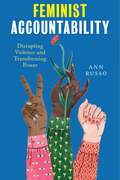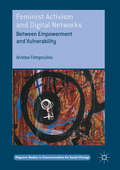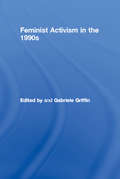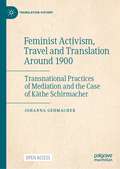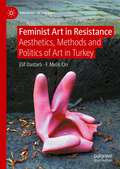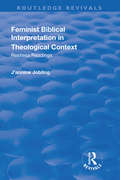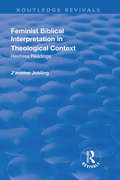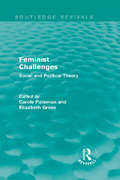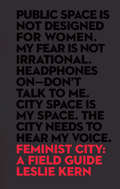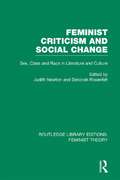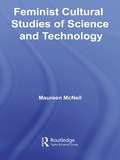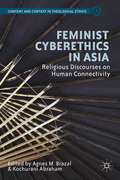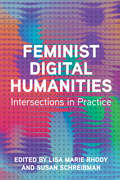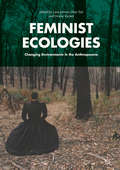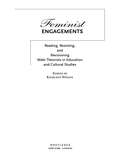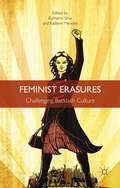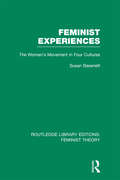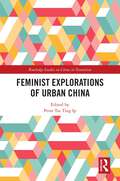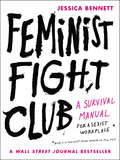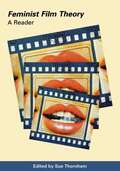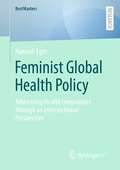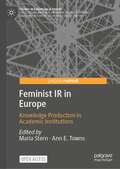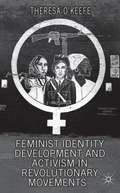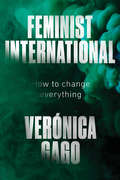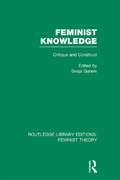- Table View
- List View
Feminist Accountability: Disrupting Violence and Transforming Power
by Ann RussoExplores accountability as a framework for building movements to transform systemic oppression and violence What does it take to build communities to stand up to injustice and create social change? How do we work together to transform, without reproducing, systems of violence and oppression?In an age when feminism has become increasingly mainstream, noted feminist scholar and activist Ann Russo asks feminists to consider the ways that our own behavior might contribute to the interlocking systems of oppression that we aim to dismantle. Feminist Accountability offers an intersectional analysis of three main areas of feminism in practice: anti-racist work, community accountability and transformative justice, and US-based work in and about violence in the global south. Russo explores accountability as a set of frameworks and practices for community- and movement-building against oppression and violence. Rather than evading the ways that we are implicated, complicit, or actively engaged in harm, Russo shows us how we might cultivate accountability so that we can contribute to the feminist work of transforming oppression and violence. Among many others, Russo brings up the example of the most prominent and funded feminist and LGBT antiviolence organizations, which have become mainstream in social service, advocacy, and policy reform projects. This means they often approach violence through a social service and criminal legal lens that understands violence as an individual and interpersonal issue, rather than a social and political one. As a result, they ally with, rather than significantly challenge, the state institutions, policies, and systems that underlie and contribute to endemic violence. Grounded in theories, analyses, and politics developed by feminists of color and transnational feminists of the global south, with her own thirty plus years of participation in community building, organizing, and activism, Russo provides insider expertise and critical reflection on leveraging frameworks of accountability to upend inequitable divides and the culture that supports them.
Feminist Activism and Digital Networks: Between Empowerment and Vulnerability (Palgrave Studies in Communication for Social Change)
by Aristea FotopoulouThis book sheds new light on the way that, in the last decade, digital technologies have become inextricably linked to culture, economy and politics and how they have transformed feminist and queer activism. This exciting text critically analyses the contradictions, tensions and often-paradoxical aspects that characterize such politics, both in relation to identity and to activist practice. Aristea Fotopoulou examines how activists make claims about rights online, and how they negotiate access, connectivity, openness and visibility in digital networks. Through a triple focus on embodied media practices, labour and imaginaries, and across the themes of bodily autonomy, pornography, reproduction, and queer social life, she advocates a move away from understandings of digital media technologies as intrinsically exploitative or empowering. By reinstating the media as constant material agents in the process of politicization, Fotopoulou creates a powerful text that appeals to students and scholars of digital media, gender and sexuality, and readers interested in the role of media technologies in activism.
Feminist Activism in the 1990s (Gender And Society Ser.)
by Gabriele GriffinFeminist activism is often taught as an historical phenomenon, and many students entering courses on women's studies are not familiar with current feminist work in the field. This book documents a wide variety of different forms of feminist activism in the 1990s, from organisations such as "Rights for Women" and "Southall Black Sisters" to "Asian Women's Work in Refuges". It raises questions about the meaning of feminist activism and its interpretation within women's studies and other academic disciplines. The chapters suggest, against much current representation within women's studies and elsewhere, that feminism is still alive.; With a comprehensive introduction providing an historical overview of the development of feminist activism from second wave feminism onwards, this text is intended to be of use as a resource for all students of women's studies and related courses.
Feminist Activism, Travel and Translation Around 1900: Transnational Practices of Mediation and the Case of Käthe Schirmacher (Translation History)
by Johanna GehmacherThis open access book takes the biographical case of German feminist Käthe Schirmacher (1865–1930), a multilingual translator, widely travelled writer of fiction and non-fiction, and a disputatious activist to examine the travel and translation of ideas between the women’s movements that emerged in many countries in the late 19th and early 20th century. It discusses practices such as translating, interpreting, and excerpting from journals and books that spawned and supported transnational civic spaces and develops a theoretical framework to analyse these practices. It examines translations of literary, scholarly and political texts and their contexts. The book will be of interest to academics as well as undergraduate and postgraduate students in the fields of modern history, women’s and gender history, cultural studies, transnational and transfer history, translation studies, history and theory of biography.
Feminist Art in Resistance: Aesthetics, Methods and Politics of Art in Turkey (Sociology of the Arts)
by F. Melis Cin Elif DastarlıThis book provides a thorough interdisciplinary analysis of the ways in which artists have engaged with political and feminist grassroots movements to characterise a new direction in the production of feminist art. The authors conceptualise feminist art in Turkey through the lens of feminist philosophy by offering a historical analysis of how feminism and art interacts, analysing emerging feminist artwork and exploring the ways in which feminist art as a form opens alternative political spaces of social collectivities and dissent, to address epistemic injustices. The book also explores how the global art and feminist movements (particularly in Europe) have manifested themselves in the art scenery of Turkey and argues that feminist art has transformed into a form of political and protest art which challenges the hegemonic masculinity dominating the aesthetic debates and political sphere. It is an invaluable reading for students and scholars of sociology of art, gender studies and political sociology.
Feminist Biblical Interpretation in Theological Context: Restless Readings
by J'annine JoblingThis title was first published in 2002: The premise of the text is that there is a continuing need for biblical hermeneutic propsals and frameworks which emerge from the fields of both feminism and Christian theology. Feminism, the author asserts, demands not only the plotting of new routes but the restructuring of entire landscapes. As such this project, since it seeks to develop a feminist theological frame for meaning, impinges on and is impacted by innumerable inter-relating questions. In consequence, the scope of the book is necessarily both broad and interdisiplinary. The author, J'annine Jobling, uses particular texts and has articulated her own positions in response. In this way the embodied practice of thinking-in-relation is mirrored in the texts produced. This has determined the macro-structure of the thesis, which is based on an analysis of two feminist biblical scholars: Elisabeth Schussler Fionenza and Phyllis Trible. From this analysis Jobling identifies two primary principles for interpretation: rememberance and destabilization. This is a strategy which allows both materialist and post-structuralist perspectives to be set into play, each of which has vital contributions to make to feminist enterprises. The "Bible" is understood as matrix, as a set of discourses which are permeable to and intersect with other cultural discourses. The task of feminist interpretation is then to reconstitute the heterogenous biblical matrix in feminist horizons. A fundamental tenet of the book is that hermeneutics inhabits particular metaphysical constructs. Therefore, the argument extends from an interpretation of the Bible to an epistemological framework in which an eschatological hereneutic is recommended, to a metaphysical framework which takes eschatology as its structuring principle. The author argues that it is eschatology which can provide the resources for an ontological model radically disruptive of a metaphysics of presence, and in which it is possible to discern the traces of God. From this outermost limit of the author's hermeneutic investigations, the text returns to the centre: the feminist discursive community and develops a construct that the ekklesia, as a feminist deliberative space set oppositionally to structures, worldviews and idealogies operates on patriarchal logics. The relationship of this "imagined community" is compared to the Christian Church and scripture, ethics and gendered identity within a logic of equity.
Feminist Biblical Interpretation in Theological Context: Restless Readings (Routledge Revivals)
by J'annine JoblingThis title was first published in 2002: The premise of the text is that there is a continuing need for biblical hermeneutic propsals and frameworks which emerge from the fields of both feminism and Christian theology. Feminism, the author asserts, demands not only the plotting of new routes but the restructuring of entire landscapes. As such this project, since it seeks to develop a feminist theological frame for meaning, impinges on and is impacted by innumerable inter-relating questions. In consequence, the scope of the book is necessarily both broad and interdisiplinary. The author, J'annine Jobling, uses particular texts and has articulated her own positions in response. In this way the embodied practice of thinking-in-relation is mirrored in the texts produced. This has determined the macro-structure of the thesis, which is based on an analysis of two feminist biblical scholars: Elisabeth Schussler Fionenza and Phyllis Trible. From this analysis Jobling identifies two primary principles for interpretation: rememberance and destabilization. This is a strategy which allows both materialist and post-structuralist perspectives to be set into play, each of which has vital contributions to make to feminist enterprises. The "Bible" is understood as matrix, as a set of discourses which are permeable to and intersect with other cultural discourses. The task of feminist interpretation is then to reconstitute the heterogenous biblical matrix in feminist horizons. A fundamental tenet of the book is that hermeneutics inhabits particular metaphysical constructs. Therefore, the argument extends from an interpretation of the Bible to an epistemological framework in which an eschatological hereneutic is recommended, to a metaphysical framework which takes eschatology as its structuring principle. The author argues that it is eschatology which can provide the resources for an ontological model radically disruptive of a metaphysics of presence, and in which it is possible to discern the traces of God. From this outermost limit of the author's hermeneutic investigations, the text returns to the centre: the feminist discursive community and develops a construct that the ekklesia, as a feminist deliberative space set oppositionally to structures, worldviews and idealogies operates on patriarchal logics. The relationship of this "imagined community" is compared to the Christian Church and scripture, ethics and gendered identity within a logic of equity.
Feminist Challenges: Social and Political Theory (Routledge Revivals)
by Carole Pateman Elizabeth GrossIn Feminist Challenges, new and established scholars demonstrate the application of feminism in a range of academic disciplines including history, philosophy, politics, and sociology. As Carole Pateman notes in her introduction, ‘all the contributors raise some extremely far-reaching questions about the conventional assumptions and methods of contemporary social and political inquiry.’
Feminist City: A Field Guide
by Leslie KernLeslie Kern wants your city to be feminist. An intrepid feminist geographer, Kern combines memoir, theory, pop culture, and geography in this collection of essays that invites the reader to think differently about city spaces and city life. From the geography of rape culture to the politics of snow removal, the city is an ongoing site of gendered struggle. Yet the city is perhaps also our best hope for shaping new social relations based around care and justice. Taking on fear, motherhood, friendship, activism, and the joys and perils of being alone, Kern maps the city from new vantage points, laying out a feminist intersectional approach to urban histories and pathways towards different urban futures.
Feminist Criticism and Social Change: Sex, class and race in literature and culture (Routledge Library Editions: Feminist Theory)
by Judith Newton Deborah RosenfeltThis lively and controversial collection of essays sets out to theorize and practice a ‘materialist-feminist’ criticism of literature and culture. Such a criticism is based on the view that the material conditions in which men and women live are central to an understanding of culture and society. It emphasises the relation of gender to other categories of analysis, such as class and race, and considers the connection between ideology and cultural practice, and the ways in which all relations of power change with changing social and economic conditions. By presenting a wide range of work by major feminist scholars, this anthology in effect defines as well as illustrates the materialist-feminist tendency in current literary criticism. The essays in the first part of the book examine race, ideology, and the literary canon and explore the ways in which other critical discourse, such as those of deconstruction and French feminism, might be useful to a feminist and materialist criticism. The second part of the book contains examples of such criticism in practice, with studies of individual works, writers and ideas. An introduction by the editors situates the collected essays in relation both to one another and to a shared materialist/feminist project. Feminist Criticism and Social Change demonstrates the important contribution of materialist-feminist criticism to our understanding of literature and society, and fulfils a crucial need among those concerned with gender and its relation to criticism.
Feminist Cultural Studies of Science and Technology (Transformations)
by Maureen McNeilFeminist Cultural Studies of Science and Technology challenges the assumption that science is simply what scientists do, say, or write: it shows the multiple and dispersed makings of science and technology in everyday life and popular culture. This first major guide and review of the new field of feminist cultural studies of science and technology provides readers with an accessible introduction to its theories and methods. Documenting and analyzing the recent explosion of research which has appeared under the rubric of 'cultural studies of science and technology' it examines the distinctive features of the 'cultural turn' in science studies and traces the contribution feminist scholarship has made to this development. Interrogating the theoretical and methodological features it evaluates the significance of this distinctive body of research in the context of concern about public attitudes to science and contentious debates about public understanding of and engagement with science.
Feminist Cyberethics in Asia
by Agnes M. Brazal Kochurani AbrahamThe Asian continent which is composed of tiger and emerging economies, is both a big producer and consumer of computer mediated communication. Research on cyberspace in the Asian context, however, began only after the 1990's when the digital revolution spread outside the West. These initial studies which were largely dependent on Western categories, did not probe into the socio-cultural contexts in which the technologies emerged and have developed. This has changed though in the past years. This anthology hopes to contribute, in particular, to the analysis of the mutually constitutive interaction of the use of cyberspace and Asian cultures, with particular attention to ethical, feminist, and religious perspectives especially within Catholic Christianity. Core themes discussed in the contributors' essays are the democratizing potential of cyberspace, the digital/gender divide, global division of digital/virtual labor, cyber-violence against women, women's resistance as well as collusion with masculinist capitalist interests on the Net, masquerading, just internet relations, how web 2. 0 spaces are shaping dynamics of power and authority in the church, cyberspace as sacred time and space, and models of spirituality for the digital era.
Feminist Digital Humanities: Intersections in Practice (Topics in the Digital Humanities)
by Susan Brown Susan Schreibman Laura Mandell Jacqueline Wernimont Nanna Bonde Thylstrup Kristin Veel Daniela Agostinho Astrid Von Rosen Monika Barget Ravynn K. Stringfield Tanya E. Clement Jaime Lee Kirtz Nikki L. Stevens Jenny Bergenmar Cecilia Lindhé Katrine Dirckinck-Holmfeld Mark Sample Lisa Marie Rhody Dhanashree Thorat Andie SilvaFeminist digital humanities offers opportunities for exploring, exposing, and revaluing marginalized forms of knowledge and enacting new processes for creating meaning. Lisa Marie Rhody and Susan Schreibman present essays that explore digital humanities practice as rich terrain for feminist creativity and critique. The editors divide the works into three categories. In the first section, contributors offer readings that demonstrate how feminist thought can be put into operation through digital practice or via analytical approaches, methodologies, and interpretations. A second section structured around infrastructure considers how technologies of knowledge creation, publication, access, and sharing can be formed or reformed through feminist values. The final section focuses on pedagogies and proposes feminist strategies for preparing students to become critical and confident readers with and against technologies. Aimed at readers in and out of the classroom, Feminist Digital Humanities reveals the many ways scholars have pushed beyond critique to practice digital humanities in new ways. Contributors: Daniela Agostinho, Monika Barget, Jenny Bergenmar, Susan Brown, Tanya E Clement, Katrine Dirckinck-Holmfeld, Jaime Lee Kirtz, Cecilia Lindhé, Laura Mandell, Lisa Marie Rhody, Mark Sample, Susan Schreibman, Andie Silva, Nikki L. Stevens, Ravynn K. Stringfield, Dhanashree Thorat, Nanna Bonde Thylstrup, Kristin Veel, Astrid von Rosen, and Jacqueline Wernimont
Feminist Ecologies
by Lara Stevens Peta Tait Denise VarneyThis edited volume critically engages with ecofeminist scholarship. It tracks the ongoing dialogue between women's issues and environmental change by republishing the work of pioneering scholars and activists in the field. Together with new essays by contemporary ecofeminist scholars, the book uncovers the dialectical relationship between environmental and feminist causes, the relational identities of feminists and ecofeminists, and the concept of ecofeminism as a rallying point for environmental feminism. The volume defines ecofeminism as a multidisciplinary project and will appeal to readers working within the field of Environmental Humanities.
Feminist Engagements: Reading, Resisting, and Revisioning Male Theorists in Education and Cultural Studies
by Kathleen WeilerFeminist Engagements is a collection of essays by some of the top names in feminist education, in which they read and revision the works of the major twentieth-century theorists in education and cultural studies.
Feminist Erasures: Challenging Backlash Culture
by K. Silva K. MendesFeminist Erasures presents a collection of essays that examines the state of feminism in North America and Western Europe by focusing on multiple sites such as media, politics and activism. Through individual examples, the essays reveal the extent to which feminism has been made (in)visible and (ir)relevant in contemporary Western culture.
Feminist Experiences: The Women's Movement in Four Cultures (Routledge Library Editions: Feminist Theory)
by Susan BassnettThe Women’s Movement is usually referred to as if it were a constant, global phenomenon. There are women’s movements in Europe, North and South America, Africa, the Middle East, India, Japan and Australia, and many women and men assume that they are regional manifestations of the same thing, and share a common core. Susan Bassnett has lived and been involved in the struggles of the women’s movement in the United States, Italy and the United Kingdom, and has had extensive contacts with feminists in the German Democratic Republic. On the basis of her personal experiences and study of women’s history and literature in these countries she is able to present a striking picture of the variety of feminist aims, tactics and priorities in the four countries, and of the character of the women’s movement in four very different cultures. In Italy, she focuses on the violence of the women’s movement – its intellectualism and energy. In analysing the American women’s movement she dwells on its roots in the past, and its faith in pragmatic solutions. The GDR presents completely different questions, hinging on the relationship between state socialism and feminism. In the UK, Susan Bassnett finds herself returning to that all-pervasive aspect of British life – class, and its importance for feminists. Throughout, the author writes with a double commitment: first, to furthering our understanding of the diversity of aims of women’s movements and their common ground – the no-man’s land of female existence; second, to making her book as accessible as possible to all feminists, through drawing on her own personal experience of countries in which she has lived, worked, travelled, and made friends.
Feminist Explorations of Urban China (Routledge Studies on China in Transition)
by Tsz Ting Ip, PennThis book explores gender topics related to social transitions and social struggles in the context of the urban transformations accompanying the evolving political economy of China’s New Era, here defined as the period since 2017.Analyzing a range of feminist perspectives, and empirically based feminist research, this book investigates the ways in which national policies and campaigns imposed under the discursive political framing of the New Era seep into the everyday lives of people, influencing how societies are transformed and how urban spaces, gendered social practices, lived experiences, and subjectivities are being (re)shaped and modified. Through explorations of these aspects of the New Era, this book reveals the new challenges and possibilities faced by different gendered social groups in contemporary Chinese society.Providing rich deliberations on gender topics related to urban developments in China’s New Era, this book will be of great interest to students and scholars of China studies, gender and women’s studies, and urban studies.
Feminist Fight Club: An Office Survival Manual for a Sexist Workplace
by Jessica BennettPart manual, part manifesto, a humorous yet incisive guide to navigating subtle sexism at work--a pocketbook Lean In for the Buzzfeed generation that provides real-life career advice and humorous reinforcement for a new generation of professional women.It was a fight club--but without the fighting and without the men. Every month, the women would huddle in a friend's apartment to share sexist job frustrations and trade tips for how best to tackle them. Once upon a time, you might have called them a consciousness-raising group. But the problems of today's working world are more subtle, less pronounced, harder to identify--and, if Ellen Pao is any indication, harder to prove--than those of their foremothers. These women weren't just there to vent. They needed battle tactics. And so the fight club was born.Hard-hitting and entertaining, Feminist Fight Club blends personal stories with research, statistics, infographics, and no-bullsh*t expert advice. Bennett offers a new vocabulary for the sexist workplace archetypes women encounter everyday--such as the Manterrupter who talks over female colleagues in meetings or the Himitator who appropriates their ideas--and provides practical hacks for navigating other gender landmines in today's working world. With original illustrations, Feminist Mad Libs, a Negotiation Cheat Sheet, as well as fascinating historical research and a kit for "How to Start Your Own Club," Feminist Fight Club tackles both the external (sexist) and internal (self-sabotaging) behaviors that plague today's women--as well as the system that perpetuates them.
Feminist Film Theory: A Reader
by Sue ThornhamFor the past twenty-five years, cinema has been a vital terrain on which feminist debates about culture, representation, and identity have been fought. This anthology charts the history of those debates, bringing together the key, classic essays in feminist film theory. <p><p> This book maps the impact of major theoretical developments on this growing field-from structuralism and psychoanalysis in the 1970s, to post-colonial theory, queer theory, and postmodernism in the 1990s. Covering a wide range of topics, including oppressive images, "woman" as fetishized object of desire, female spectatorship, and the cinematic pleasures of black women and lesbian women, the book is an indispensable reference for scholars and students in the field.
Feminist Global Health Policy: Addressing Health Inequalities through an Intersectional Perspective (BestMasters)
by Hannah EgerHealth inequalities, primarily driven by the structural determinants of health, are a major concern towards the global goal of health for all. A feminist global health policy has the potential to address the unequal distribution of power and to dismantle these imbalances. The prioritisation of intersectional, holistic, human rights-based approaches intends to advance health equality and reproductive justice. This research examined the contours and potentials of a feminist global health policy by developing a framework. Online focus groups were conducted with participants affiliated to either the global-academic or local-activist level, envisaging global representation. The elaborated framework provides a nexus between the global and the local level, by entailing universal principles as well as recommendations and sensitivity for context-specific adaptations. Community and policymakers are identified as key actors. This research aims to stimulate a debate on feminist global health policy and the potential of this framework with regard to health equality and reproductive justice.
Feminist IR in Europe: Knowledge Production in Academic Institutions (Trends in European IR Theory)
by Maria Stern Ann E. TownsThe aim of this open access book is to take stock of, critically engage, and celebrate feminist IR scholarship produced in Europe. Organized thematically, the volume highlights a wealth of excellent scholarship, while also focusing on the politics of location and the international political economy of feminist knowledge production. Who are some of the central feminist scholars located in Europe? How might the concentration of these scholars in Northern Europe and the UK shape the contents of their scholarship? What have some of the main contributions been, in the study of the following themes: security; war and military; peace; migration; international political economy and development; foreign policy; diplomacy; and global governance and international organizations? The volume offers both an intellectual history and a sociology of feminist IR scholarship in Europe. It showcases the vitality and breadth of feminist IR traditions, while simultaneously calling attention to their partial nature, exclusions and silences.
Feminist Identity Development and Activism in Revolutionary Movements
by Theresa O’KeefeThis book examines how many women active in revolutionary movements develop feminist identities and how this identity simultaneously contributes to and conflicts with the struggle for women's emancipation.
Feminist International: How to Change Everything
by Veronica GagoLeader of Latin America&’s powerful new women&’s movement rethinks the meaning of feminist politicsRecent years have seen massive feminist mobilizations in virtually every continent, overturning social mores and repressive legislation. In this brilliant and original look at the emerging feminist international, Verónica Gago explores how the women&’s strike, as both a concept and collective experience, may be transforming the boundaries of politics as we know it.At once a gripping political analysis and a theoretically charged manifesto, Feminist International draws on the author&’s rich experience with radical movements to enter into ongoing debates in feminist and Marxist theory: from social reproduction and domestic work to the intertwining of financial and gender violence, as well as controversies surrounding the neo-extractivist model of development, the possibilities and limits of left populism, and the ever-vexed nexus of gender-race-class. Gago asks what another theory of power might look like, one premised on our desire to change everything.
Feminist Knowledge: Critique and Construct (Routledge Library Editions: Feminist Theory)
by Lynn Ross-BryantThe ‘minority’ feminist viewpoints have often been submerged in the interests of maintaining a mainstream, universal model of feminism. This anthology takes into account the various differences among women while looking at the important areas of feminist struggle. While sisterhood is indeed global, it certainly does not mean that all women are required to submerge their specific differences and assimilate to a universal model. Consequently, the collection includes essays by leaders in the field of post-structuralist enquiry as well as by those immersed in the new spirituality, and the social consequences of recent biological research. Other essays reflect the political struggles which continue to be waged with different strategies by socialist and radical feminists, and the self-searching analyses undertaken by feminists uneasy about their inclusion within educational institutions and the radical new interpretations of sexuality within the cultural domain. The collection begins with a critique of white mainstream feminism emanating from Aboriginal women in Australia. The implications of the critique indicate that there is a pervasive racism within the feminist movement.
